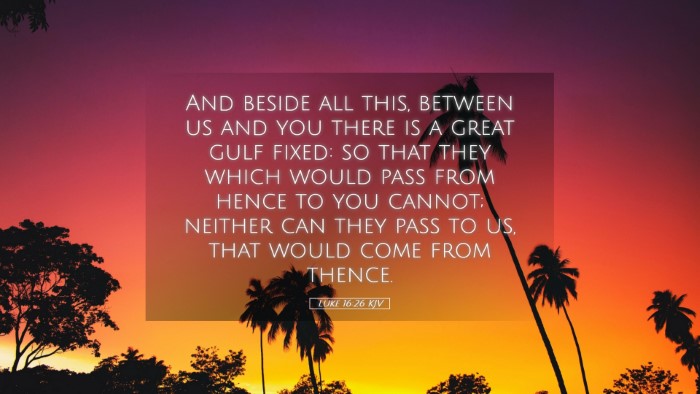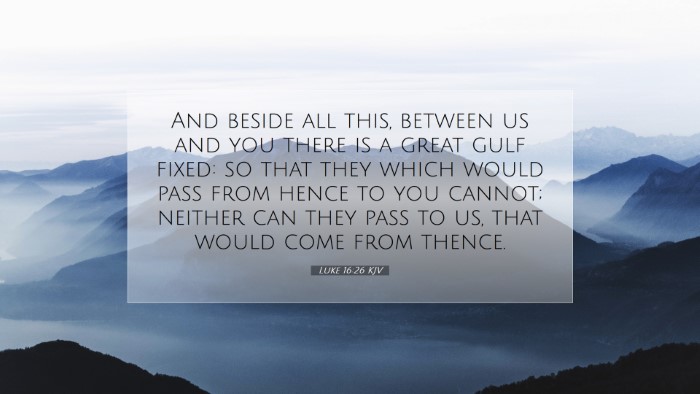Bible Commentary on Luke 16:26
Verse: Luke 16:26
"And besides all this, between us and you there is a great gulf fixed: so that they which would pass from hence to you cannot; neither can they pass to us, that would come from thence."
Introduction
The passage found in Luke 16:26 is part of the Parable of the Rich Man and Lazarus, which provides profound insights into the state of the soul after death, the permanence of one’s fate, and the impossibility of altering one’s condition in the afterlife. Commentators such as Matthew Henry, Albert Barnes, and Adam Clarke provide valuable perspectives on this verse that underscore its theological implications.
Commentary Insights
1. The Great Gulf Fixed
Matthew Henry emphasizes the significance of the "great gulf" that is mentioned. This gulf symbolizes the chasm that separates the righteous from the unrighteous after death. Henry notes that it represents an eternal separation that reflects God’s justice and holiness, condemning the unrepentant while allowing the faithful to enjoy divine favor.
Nature of the Separation
Henry illustrates that the nature of this separation is permanent; no one can cross from one side to the other. This aspect of the gulf serves as a potent reminder of the consequences of our earthly choices and serves to warn the living about the urgency of repentance and faith.
2. Impassable Barrier
Albert Barnes commentary on this verse highlights the impassable barrier represented by the great gulf. He points out that this idea emphasizes the finality of one's spiritual state after death. For Barnes, this reflects the doctrine of eternal judgment where decisions made in life have irreversible consequences in the hereafter.
Exegesis of 'Cannot Pass'
Barnes further elaborates that the statement "they which would pass from hence to you cannot" signifies a divine ordination – a boundary that is established by God’s sovereign will. He stresses that attempts to bridge this gulf through moral conduct or good works are futile, reinforcing the need for faith and divine grace.
3. Theological Reflection
Adam Clarke takes a more reflective approach, discussing the spiritual implications of this verse. Clarke asserts that the rich man’s plea for relief serves as a powerful echo of human despair in the face of eternal judgment. He questions the moral responsibility of those who have been blessed with knowledge of God’s truth yet fail to heed its warnings.
The Rich Man’s Plea
Clarke notes that the rich man’s request to send Lazarus to warn his brothers stresses the desire for revelation, indicating that awareness and knowledge can shape one’s eternal destiny. However, the refusal of such a means highlights the sufficiency of scripture and divine revelation already available to humanity.
4. Applications for Life
Each of these commentators provides practical applications stemming from the theological insights of this verse. Here are a few key takeaways:
- The Weight of Choices: Choices have eternal ramifications, prompting believers to live righteously and share the gospel with others.
- Urgency of Repentance: There is a sense of urgency to turn toward God, reflecting the biblical message that today is the day of salvation.
- The Importance of Scripture: The rich man's request underscores the sufficiency of the biblical witness. Clarke’s emphasis invites believers to prioritize engagement with scripture for spiritual guidance.
- Awareness of Judgment: An understanding of divine judgment should motivate believers to pursue holiness and evangelistic efforts.
Conclusion
Luke 16:26 serves not only as a narrative device in a parable but also as a critical discourse on the nature of judgment and the reality of the afterlife. The insights from Matthew Henry, Albert Barnes, and Adam Clarke collectively enhance our understanding of this vital scripture, emphasizing a deep understanding of the eternal consequences of human actions while providing motivational exhortation for living faithfully in accordance with divine truth.


